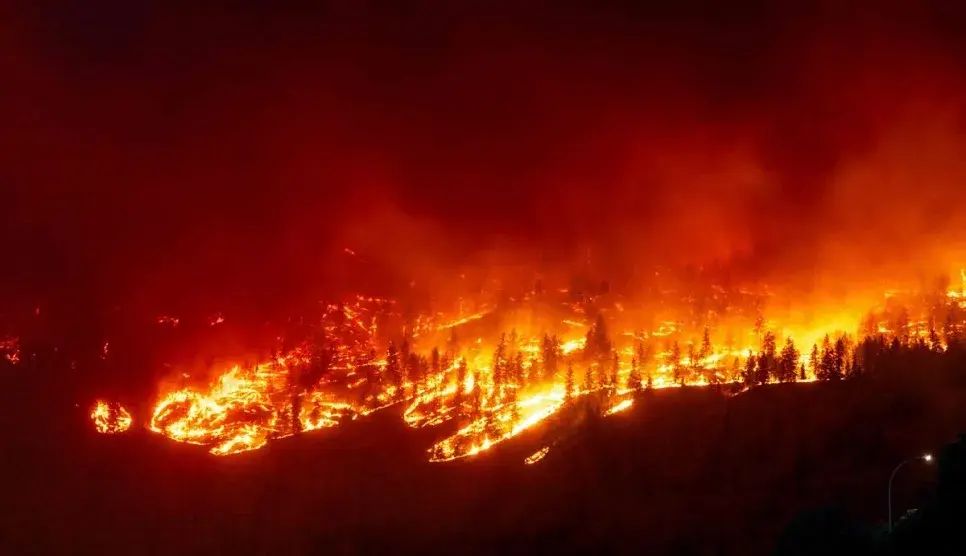Blocking News on Facebook Amid Wildfires – Meta is being accused of putting people’s lives in peril by restricting news links in Canada at a critical time such as this when thousands have evacuated their homes and are eager for wildfire updates that were once routinely shared on Facebook. The situation “is dangerous,” said Kelsey Worth, 35, one of almost 20,000 Yellowknife residents and thousands more in small villages ordered to flee the Northwest Territories as flames raged.

She told AFP that it has been “insanely difficult” for herself and other evacuees to acquire verified information about the fires raging over the near-Arctic region and other parts of Canada. “No one knows what’s true or false,” she remarked. “And when you’re in an emergency situation, time is of the essence,” she explained, adding that many Canadians have previously relied on social media for news.
In reaction to a recent regulation forcing internet firms to pay publishers for news content, Meta began limiting the dissemination of news links and articles on its Facebook and Instagram platforms on August 1. The firm has been in a virtual standoff with Ottawa over the measure, which was passed in June but will not go into effect until next year.
Building on similar regulations introduced in Australia, the bill attempts to help Canada’s faltering news industry, which has seen advertising dollars flee and hundreds of magazines close in the previous decade. It forces firms like Meta and Google to make reasonable commercial terms with Canadian publications for the news and information shared on their platforms, estimated in a parliamentary assessment to be valued at Can$330 million (US$250 million) every year, or face binding arbitration.
However, Meta has stated that the measure is incorrect and that news organizations could publish material on their Facebook and Instagram platforms to attract users, benefiting them rather than the Silicon Valley business.
Blocking News on Facebook Amid Wildfires? Inconceivable
This week, Canadian Prime Minister Justin Trudeau slammed Meta, saying it was “inconceivable that a company like Facebook is choosing to put corporate profits ahead of (safety)… and keeping Canadians informed about things like wildfires.” Almost 80% of all online advertising earnings in Canada are generated by Meta and Google, both of whom have raised worries about the new rule.
The director of Cabin Radio in the far north, Ollie Williams, branded Meta’s decision to prohibit news sharing “stupid and dangerous.” In an interview with AFP, he argued that “Meta could temporarily lift the ban in the interests of life preservation and suffer no financial penalty because the legislation has not taken effect yet.”
Over at Radio Taiga, a French-language station in Yellowknife, Nicolas Servel noticed that some people have found ways around Meta’s block. He stated that they “found other ways to share” information, such as taking screenshots of news stories and distributing them from personal – rather than business – social media accounts.
Several major Canadian newspapers, including The Globe and Mail and The Toronto Star, have started campaigns to direct readers to their websites. Workarounds, however, have proven difficult for many smaller news sites as social media platforms have become entrenched. In a letter this week, the Canadian Broadcasting Corporation (CBC) urged Meta to change course.
It’s a matter of public safety
“Time is of the essence,” stated Catherine Tait, president of the CBC. “I urge you to consider taking the much-needed humanitarian action and immediately lift your ban on vital Canadian news and information to communities dealing with this wildfire emergency.” As over 1,000 wildfires rage throughout Canada, she says, “The need for reliable, trusted, and up-to-date information can literally be the difference between life and death.”
CBC’s recommendation was rejected by Meta, which did not respond to AFP’s demands for comment. Instead, it asked Canadians to use Facebook’s “Safety Check” feature to let others know if they were safe or not. According to Patrick White, a professor at the University of Quebec in Montreal, Meta has demonstrated itself to be a “bad corporate citizen.” “It’s a matter of public safety,” he said, adding that he is confident Ottawa will eventually reach an agreement with Meta and other digital behemoths that meets their concerns.



















